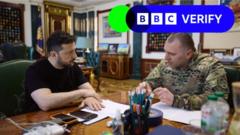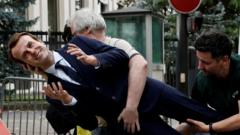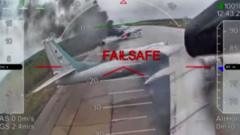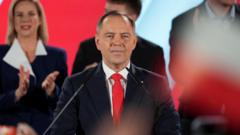**General Carsten Breuer states Russia's rapid military buildup could lead to an attack on NATO Baltic states as early as 2025.**
**Germany Warns of Potential Russian NATO Aggression by 2029**
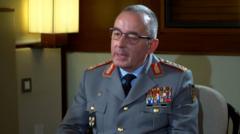
**Germany Warns of Potential Russian NATO Aggression by 2029**
**German defense chief highlights imminent threats from Russia, urging NATO preparedness.**
In an alarming statement made during the Shangri-La Dialogue in Singapore, Germany's defense chief, General Carsten Breuer, emphasized the heightened risks posed by Russia, suggesting that NATO members should be prepared for a potential assault on its Baltic state allies within the next four years. Breuer reported that Russia is producing an unprecedented number of military tanks—around 1,500 annually—which could be cycled into military structures targeting NATO by 2029, if not sooner.
Despite minor disagreements among some of its members, including Hungary and Slovakia, General Breuer reaffirmed NATO's unity in the context of the ongoing conflict in Ukraine. The defense chief underscored this unity ahead of an upcoming NATO summit in The Hague, where crucial discussions regarding defense strategies and budgets are forecasted.
Breuer characterized the current threat from Russia as something unprecedented in his four-decade career. He pointed to a significant military buildup, including an estimated four million artillery rounds earmarked for future confrontations rather than immediate engagements in Ukraine. "Analysts predict a pivotal moment by 2029; however, this is not a strict timeline. We must be prepared to respond immediately," he stated emphatically.
There is a palpable anxiety surrounding the security of NATO member states, especially concerning the Suwalki Gap—an area they deem highly vulnerable. Emphasizing a keen sense of urgency, Breuer illustrated the varying perceptions of the threat across Europe, with Baltic states feeling the immediate impacts of Russia’s military presence more acutely than countries like Germany.
The general highlighted that from Moscow's perspective, the conflict in Ukraine is an extension of a broader confrontation with NATO, manifesting in unconventional tactics, including cyber-attacks and reconnaissance flights over critical infrastructure in Germany.
To counter this growing threat, Breuer called on NATO allies to enhance their military capabilities and adopt a collective commitment to deterrence strategies. He acknowledged historical reductions in defense spending across various Western nations but recognized a paradigm shift in approach, with even political factions such as Germany's Green Party acknowledging the urgent need to fortify national defense initiatives.
As NATO leaders pivot towards a more proactive stance regarding defense preparations, significant questions loom about the practical challenges in aligning military capabilities with the rapid pace of Russian armament advancements. Notably, the U.S. is also re-evaluating its defense priorities, focusing more on the Indo-Pacific region, which adds another layer of complexity to NATO's readiness to face potential aggression from Russia.

